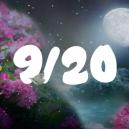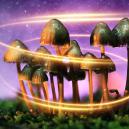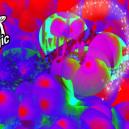Meditating On Psychedelics
Published :
September 4th, 2018
Categories :
Research

Ancient meditation practices are still being used as a form of mental hygiene, calming the mind and body. Psychedelics are said to do wonders for expanding conscious awareness. New research suggests that doing both at the same time could be beneficial.
There is a lot of overlap between meditation and psychedelics. Meditation is the practice of focussing the mind on a mantra, breathing, or some other repetition in order to reach a state of mental clarity. There are accounts of meditation going back thousands of years, some tied up with religious traditions.
Psychedelics are all the delightful psychoactive chemicals that expand human consciousness. Psychedelic substances like psilocybin and DMT also have religious practices based around them. Both meditation and psychedelics invite the practitioner to come to terms with the nature of reality. They are based around connecting with the universe and going with the flow of your thoughts. Now, researchers are seeing the advantages of combining the two.
Meditation can be practiced with or without the use of psychedelics. It may be advisable to first get used to meditating on a regular basis without the use of psychedelics. The occasional trip may help reinforce the benefits of your practice. It depends on a disciplined commitment to putting aside time to meditate each day. Usually, this will involve sitting still with good posture and focussing on breathing patterns, ambient sounds, music, or a repeated mantra or physical action.
THE BENEFITS OF MEDITATION
One particular form of meditation became popular in the West after Maharishi Mahesh Yogi taught the technique of Transcendental Meditation to several famous musicians—most notably, The Beatles.
The filmmaker David Lynch discovered the technique and established The David Lynch Foundation to promote the use of Transcendental Meditation in the resolution of conflict and mental health issues. The David Lynch Foundation has also supported research into the demonstrable health benefits of Transcendental Meditation. While the Hindu spiritual perspective is part of the technique's history, it can be practiced as a secular form of mental hygiene with no religious obligations. The technique simply consists of sitting still for 20 minutes twice a day while focussing on the repetition of a silent, secret Sanskrit mantra.
The David Lynch Foundation has gathered research affirming the many health benefits of this simple practice. Blood pressure, stress, and anxiety all seem to be lower after consistent practice. Perhaps this is because it gives one a chance to simply observe thoughts and regain a sense of connection with the physical world.
Think of your brain as though it were a computer that won't function as well when overheated. Transcendental Meditation is comparable to a system scan that gives your brain time to reboot and function better. Meditation can therefore do wonders for the hardware of your brain. But what happens when we throw in some psychedelic software?
PSYCHEDELICS IN RELIGION
It is worth noting that psychedelic chemicals have found their way into religious traditions stretching back a long time. They have emerged across disparate cultures. There is the de facto tolerance of DMT among many indigenous communities of the Amazon. Various tribes there discovered a combination of DMT and an MAO-inhibiting root, known as ayahuasca. This is used in a ceremony for confronting personal demons in a vivid trip lasting several hours. This can result in heavy vomiting and temporary ego death, but users often recount life-changing realisations under its influence. Some would even equate it to ten years of therapy.
WHAT THE RESEARCH SAYS
More and more is being discovered about the health benefits of psychedelic substances like DMT and psilocybin. Michael Pollan recently released a book entitled “How To Change Your Mind: What the New Science of Psychedelics Teaches Us About Consciousness, Dying, Addiction, Depression and Transcendence”. The book explores many medical applications of psychedelics, including how high-dosage mushroom trips monitored by a therapist can have great cathartic value. When seeking to recover from deep-seated emotional issues, guided use of psychedelics could be promising for tapping the mind's potential.
A team of neuroscientists led by Professor Frederick Barrett of John Hopkins University have been studying this connection. Their 2016 study in Lancet Psychiatry found that 42% of patients experienced complete remission of depression symptoms after 3 months of monitored psilocybin use. The study calls for "further trials, with more rigorous designs" to confirm whether they are right to have cautious optimism in the medical applications of magic mushrooms.
WHAT HAPPENS WHEN YOU COMBINE MEDITATION AND PSYCHEDELICS
Science seems to indicate both meditation and psychedelics have promising medical applications. And religions around the world have managed to incorporate both in their search for the unknown. Perhaps they are not so different as they both involve altering the mind towards greater understanding. There's a yearning to see the world with clarity and heal emotional harms. This is the enduring appeal of spirituality.
Leading pioneers of psychedelics such as Terence McKenna and Timothy Leary posited that this could in fact be the reason behind the social stigma towards psychedelics. If they can expand human consciousness, without even the need for religion, they have the potential to give the public access to knowledge that cannot be controlled. This is a lofty view to take of tripping, but it does recognise a fear many have of heading into the unknown.
More needs to be discovered about the effect of psychedelics on the brain. Knowing what we already know, how could psychedelics impact the experience of meditation? So much of meditation is about attuning to the physical sensations we feel. The feeling of clothes on our skin, the weight of our body on the ground, and so on. Psychedelics heighten physical sensations, so they may help to relax you into a meditative mindset. On the other hand, they could also stimulate your mind in a way that makes you easily distracted. Starting out with small doses and working your way up from there is standard procedure when combining psychedelics and meditation. Perhaps the benefits of both will be enhanced. Proceed with caution.























